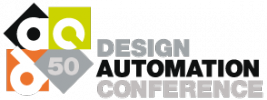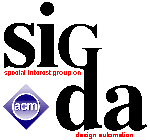
The
First Workshop on Modeling of Biological Systems (MoBS'13)
Austin, TX, June 2nd 2013
The First Workshop on Modeling of Biological Systems (MoBS) at DAC focuses on computational methods, algorithms, and software tools for the modeling and analysis of biological systems. For biologists, this workshop is an opportunity to showcase their work to an entirely new audience and gain exposure to a new talent pool of potential postdocs and graduate students. For EDA experts, the workshop provides an excellent opportunity to explore challenges in biology and medical research, and recognize potential for new collaborations and novel applications of methods and techniques they are familiar with.
The workshop format includes invited talks by leading researchers in computational biology, oral presentations and posters. The workshop encourages early dissemination of ideas and results highlighting important new problems in the early stages of development, without providing complete solutions.
Topics of interest include (but are not limited to):
· biological
network inference
· optimization/learning
techniques applied to biological data
· statistical
modeling of biological systems
· CAD
and visualization of biological systems
· data-mining
for bio and health-care systems
· hybrid
methods for bio-system simulation
· bio-model
validation and verification
· sensitivity
analysis for biological systems
Invited
Speakers:
·
Edward Dougherty, Texas A&M
· Dana Pe’er,
Columbia
· Josh Stuart,
University of California, Santa Cruz
· Shuichi
Takayama, University of Michigan, Ann Arbor
Key Dates:
Call for abstracts published:
February 20, 2013
Abstract
submission deadline: April
15, 2013 April 25, 2013
Abstract acceptance
notification: April
25, 2013 May 7, 2013
Final version
due: May 13, 2013
Abstract
Submission:
You can submit your abstract using EasyChair. Abstracts should
not exceed 500 words. The submission should indicate whether you would like
your abstract considered for a poster presentation, an oral presentation, or
both. Include the full names, affiliations and contact information of all
authors.
Abstracts will be reviewed by the
Program Committee. Those that are selected for oral and poster presentations
will be distributed to workshop participants and posted on the workshop
website.
Student Travel Support:
Support funds for students may be available. Please send the following to nmiskov@andrew.cmu.edu by April 15 April 25, but we will accept applications as long as funds are available:
· Your name
· Affiliation
· Year in school
· 50-100 word statement detailing why you seek support.
Workshop
Organizers:
Smita Krishnaswamy, Columbia
(sk3349@columbia.edu)
Natasa Miskov-Zivanov, UPitt, CMU (nmiskov@andrew.cmu.edu)
Subarna Sinha, Stanford
(subarnas@stanford.edu)
Program
Committee:
Michael Deem, Rice
Jasmin Fisher, Microsoft Research, UK
Soha Hassoun, Tufts
Alexander Hoffmann, UCSD
Sunil P Khatri, Texas A&M
Pietro Lio', Cambridge, UK
Chris J. Myers, Utah
Jaijeet Roychowdhury, UC Berkeley
Other pages:
Like us on Facebook: MoBS
workshop Facebook page
You can find MoBS abstracts here.
Program:
9:00am-9:15am: Opening Remarks
by MoBS organizers
9:15am-9:50am: Keynote talk 1: Dana Pe'er, Columbia University
Title: Visualizing
and Analyzing Heterogeneity in Cancer
9:50am-10:25am: Keynote talk 2:Shuichi
Takayama, University of Michigan, Ann Arbor
Title:
Microfluidic Analysis of Cell Signaling
10:25am-10:45am: Invited Talk 1: Erin
Simonds, UCSF School of Medicine
Title:
TBD
10:45am-11:00am:
Coffee Break
11:00am-11:20am: Invited Talk 2: Ruisheng
Wang, Pennsylvania State University
Title:
Identification of key components in cellular networks using elementary
signaling modes
11:20am-12:00pm:
Contributed Talks, Session 1
Contributed
talk 1: Smita Krishnaswamy, Columbia University
Title:
Characterizing Stochastic Signaling Interactions Through the T-Cell Maturation Process
Contributed
talk 2: Dan Connors, University of Colorado, Denver
Title:
GPU Acceleration of the Exploration of the Parameter Space of Fitting Synaptic Models to Measured Responses
12:00pm-
2:00pm: Lunch and Poster Session
2:00pm-2:35pm: Keynote talk 3:
Josh Stuart,
University of California, Santa Cruz
Title:
TBD
2:35pm-3:10pm: Keynote talk 4:
Edward Dougherty,
Texas A&M University
Title:
Optimal Therapeutic Intervention in Gene Logic
3:10pm-3:30pm: Invited Talk 3: Karen
Sachs, Stanford University
Title:
TBD
3:30pm-3:45pm: Coffee Break
3:45pm-4:20pm: Keynote Talk 5: David LaPotin, IBM
Title:
TBD
4:20pm-5:00pm: Contributed Talks,
Session 2
Contributed
talk 3: Soha Hassoun, Tufts University
Title: Deriving Reduced Kinetic Models for Biological Modules
Contributed
talk 4: Pey-Chang Lin, Texas AM University
Title:
Gene Predictor Ranking and Function Selection Using Zhegalkin Functions
5:00pm-5:10pm:
Break
5:10pm-5:30pm: Invited Talk 5: Andras
Gyorgy, MIT
Title:
Modularity in Gene Transcription Networks
5:30pm-5:50pm: Invited Talk 6: Uri-David
Akavia, Columbia University
Title:
Integrative and parallel approaches to uncover drivers of cancer
5:50pm-6:30pm:
Contributed Talks,
Session 3
Contributed
talk 5: Subarna Sinha, Stanford University
Title:
Extracting Boolean Implication Networks from Large, Heterogeneous Genomic Data
Contributed
talk 6: Natasa Miskov-Zivanov, University of Pittsburgh/Carnegie Mellon University
Title:
Circuit design techniques for automated construction of mosquito immune response model in malaria infection
6:30pm-6:40pm:
Closing remarks
Posters:
Rohit Shukla, Parmeswaran Ramanathan, Devesh Bhimsaria and Aseem Ansari. Virtual Foundry for Gene Synthesis
Janet Roveda and Dung Nguyen. Real Time Test based Yeast Circuit Design for Protein Pathway Identification
Alessandro A. Nacci, Vincenzo Rana, Francesco Bruschi, Marco D. Santambrogio, Enzo Wanke and Donatella Sciuto. NeoN:
a software tool for the automatic extraction of neurons communication pattern
Goutham Makkena, Srinivas M.B and Avinash Vaidya. Approximation of Mother Wavelets using Levin Transforms for characterization of Biological data
Shogo Nakaya and Yuichi Nakamura. Adaptive Sensing of Cardiac Signals with the Help of R-R Interval Prediction
Sponsors:



